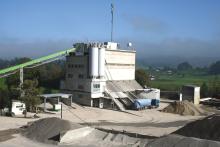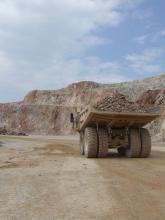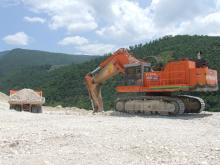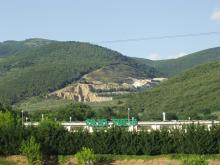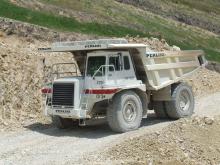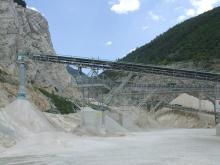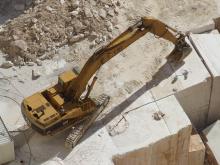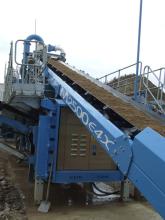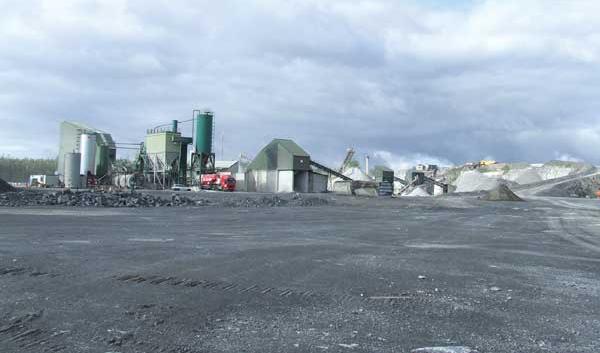
Family-owned McGraths Quarries proves that you don't have to be a multinational player to gain recognition for environmental excellence. Claire Symes met with John Joe and Michael McGrath to find out more
The need for environmental awareness and investment in protection measures is now an accepted part of the modern approach to quarrying but it hasn't always been that way. Nonetheless, one family-owned quarry operation in Ireland has consistently placed the environment at the forefront of its work in a way that was over and above the legislative requirements.
This approach is what has helped County Mayo-based
Delicate position
Not only does the quarry lie almost on the boundary of Counties Galway and Mayo, which complicates the legal aspects of the quarry's operation, it also lies in a delicate environmental position. The pretty village of Cong - the setting for the film The Quiet Man - is not only a thriving international tourist attraction but also lies within a delicate ecosystem with complex hydrology.
Cong is surrounded by water - some bubbling up through the karstic limestone landscape - but it also sits between two major loughs - Lough Mask to the north and Lough Corrib to the south. The two are connected by a canal, which is the only route for Lough Mask to drain and runs right alongside the eastern boundary of the quarry.
"We are working in a very sensitive area and there is a real need to keep our neighbours happy in order for the quarry to continue operating," explained McGraths director John Joe McGrath. "We have always been aware of our position and invested in environmental protection over many years in order to prevent the quarry from impacting on the environment here. It is unlikely that we would get permission for a quarry in this location if we applied for it today.
"Each year we try to invest in something to improve the environmental operation - usually around €20,000 to €30,000 per year. This year we are planting more trees along the embankment we have built along the eastern edge of the quarry to screen it from the canal. We hope to build a walkway along the canal for the use of local people and tourists in the near future." The quarry was awarded Irish Concrete Federation Quarry of the Year 2007 for outstanding achievement in Environmental Management especially with regard to water management, visual impact mitigation and restoration planning. Installation of a water treatment plant in order to ensure high quality discharged groundwater for the protection of salmon rivers and the loughs was a key part of McGraths winning of this award.
The company also started planted a nursery in 2004 where many different species of trees are grown for use within the quarry. The quarry is a habitat for feral goats and the company has increased the depth of the buffer zone around the site to boost the habitat for the goats.
"Winning these awards has been fantastic and we are very proud of the achievements," said John Joe. "After winning the ICF award, entry into the UEPG scheme this year was automatic but we did not expect to win against such strong competition." Talking to local people in the village of Cong it is clear that they hold the quarry in high regard and the family has worked hard to achieve this. In recent years the company has built a stone wall around the wooded edge of the site so to the outside eye it looks like a country estate. McGraths also regularly sweeps the village streets to ensure they are clean and sponsors local events and football teams.
"We call all the house owners around the quarry to warn them of an upcoming blast," said John Joe. "If we receive any complaints then I deal with it personally to ensure it gets resolved quickly." John Joe is not just committed to the local community but also to the industry as a whole - he served as president of the ICF from 1998 to 2000 and was one of the key players in the establishment of the organisation in the early 1980s.
Family history
The Cong quarry was acquired by John Joe and Michael's father (also Michael) in the 1960s but was first opened by another local family in the late 1950s. "Material from the quarry was originally only used for agricultural liming of the land - there was a demand due to the subsidy paid by the government at the time to promote the practice," explained Michael. At the time there were five quarries in the area but today only McGraths site is still operational.
Both John Joe and Michael worked in the quarry in their summer holidays and joined their father's business after leaving school but his untimely death at 49 in 1970 meant they were soon heading up the company. With 10 children to support - the youngest just three months - Michael's widow Mary took over running of the business for a few years and her eldest daughter also joined the business.
Once the brothers took over operation of the quarry, they soon looked to expand the markets the company served - a strategy that has continued through to the present day. When Michael McGrath Senior died the quarry covered less than 3ha and produced around 30 to 40tonne per day at the height of the liming season. Today the quarry occupies over 70ha and produces 500,000tonnes per year.
This growth has been achieved through a combination of shrewd investment in equipment and continually surveying the market for new opportunities.
The first diversification took the quarry into manufacturing of stone for building and aggregates for road construction in 1974 and eight years later the quarry expanded to the production of ready mixed concrete and concrete. The quarry now produces eight aggregate sizes, plus quarry dust, which is delivered over a 60km area - sometimes further when there is demand in Connemara where there are fewer quarries. Lime products are delivered to sites up to 130km from Cong.
Material from McGraths quarry is in high demand because of the quality of the deposit - it has a very high calcium carbonate content and the deposit is also very cleanly bedded with few fractures.
Export of weathered limestone to mainland England for use by gardening centres and local authorities for landscaping purposes started in 1995. The next major investment came just a few years later in 1998 when the company installed a modern asphalt plant and started working on road construction contracts. Around five years ago the company added self levelling floor screeds to the product range.
The quarry is still very much a family concern with two more of John Joe and Michael's brothers Billy and Pat also working alongside them and their sister Marguerite, and another six of the third generation of the McGrath family work in the business. John Joe's sons Keith and Damien oversee the environmental and quarry management aspects, while Michael's daughter Linda is training to manage the office side of the business and his son Michael manages the road surfacing contracts.
In total the company employs 50 people - one of whom worked for the company under Michael Snr's management. "Seamus Walsh started working at the quarry when my father owned it," said John Joe. "He is 62 and a valuable member of the team here. We are lucky to have a very loyal workforce and people understand the issues we are facing here." Keith McGrath cites the most recent investment with helping the company to ride out the current difficult financial climate. In 2008 after years of research and testing the company erected a e1.7million calcium carbonates plant for the production of fine powdered and granular limestone for supply to industrial, construction chemical, agricultural and glass manufacturing sectors. He added that the company is also looking at the potential to export the material as the purity and low iron content mean there is a demand for it.
True to the company's investment strategy, parts of the new plant are second hand and was designed to McGraths own specification. According to Keith, this allowed the company to specify a plant that closely matched its needs while minimising costs.
"When I first started working here all the extraction was done by hand," said John Joe. "My brother loves machinery so was keen to mechanise the quarry and the first equipment we bought was second hand. Our first new machine was a
"We have always tried to buy equipment twice the size that we need at the time of investment - this not only reduces the wear and tear on it but also gives room for expansion," explained John Joe.
Market
Despite the investment and diversification, the market in Ireland is still tough and John Joe reports that McGraths turnover was down 60% in 2009 and this year is still difficult. "There is some recovery in the agricultural sector," he said. "Agriculture was our biggest sector until the building boom here. We have seen cycles in the construction market before - not as bad as this one - but it will come back.
"Our new calcium products are proving popular, road construction work is still going on but housing is dead and it will take two to three years to sort out."
McGraths' Cong quarry currently has more than 40 years of deposits and plans are in place to acquire more land. "There are plenty of reserves here," said John Joe. On the subject of restoration, John Joe said that the quarry will eventually be flooded - probably stocked with fish. "Then there will be three loughs in Cong - Lough Mask, Lough Corrib and Lough McGrath," he said. "But that won't be in my lifetime."

